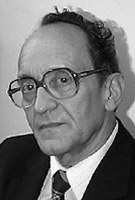Tondeur To Be New Director Of Math Sciences at NSF
May 22, 1999

Phillipe Tondeur
On July 21, Philippe Tondeur, chair of the Department of Mathematics at the University of Illinois at Urbana-Champaign, will succeed Donald J. Lewis as director of the Division of Mathematical Sciences at the National Science Foundation. At Illinois since 1968 (as department chair since 1996), Tondeur has worked in differential geometry, in particular the geometry of foliations and applications of partial differential equations in differential geometry.
As a guest of the Joint Policy Board for Mathematics at its April 19 meeting, Tondeur briefly introduced himself to the ten JPBM members (representing the American Mathematical Society, the Mathematical Association of America, and SIAM) and other guests. The JPBM meeting, in that the interests, perspectives, and concerns of the member societies often vary widely, and especially in that the meeting also included discussion of the proposed federal IT^2 initiative for 2000, can be seen as a microcosm of the world Tondeur will be entering in July.
It's a world in which he is eager to immerse himself, and his years as department chair at Illinois have provided him with considerable experience for the challenges he will face. One important consideration is that much of the work called for in IT^2---as in most large problems in science and technology---can be done only in an interdisciplinary setting.
At Illinois, even before he became chair, says UIUC mathematics professor Joseph Rosenblatt, Tondeur was working to improve the department's connections with other departments in the university. Rosenblatt cites the seminar series "Mathematics in Science and Society" (now in its fifth year, with speakers this spring including George Papanicolaou, on impedance tomography; Peter Winkler, on hard constraints and the Bethe lattice; and Christopher Jones, on nonlinear optical media) as one successful innovation.
In addition to "successful efforts to attract new faculty with outstanding strength in research and teaching, as well as real interest in interdisciplinary collaboration," Rosenblatt says, Tondeur has "worked assiduously on improving communications with other departments at the university." Joint research projects, innovative team-taught courses, and release time for interdisciplinary study are among the changes he supported.
Tondeur's "tenure as chair has seen the department grow in numbers, breadth, and, most importantly, in academic excellence," UIUC provost Richard Herman tells SIAM News. "Philippe has both imagination as to what can be accomplished and the persistence and inventiveness to ensure that it does."
"We're in an age of synthesis," Tondeur told the JPBM audience; opportunities for interdisciplinary interactions in science and engineering abound. IT2, he said, is "filled with mathematical ideas": information management, data mining, geometric visualization, operations research, the study of algorithms, complexity theory . . . ." That said, however, ensuring that the mathematical sciences actually get to play a role in an initiative is a big challenge. One of the DMS director's roles, Tondeur explained, is to "go shopping in the many divisions at NSF," looking for ways in which mathematics can work with other disciplines.
On the question of goals for DMS in the coming years, Tondeur said that he would work to implement the recommendations of the 1998 report of the Senior Assessment Panel (http://www.nsf.gov/cgi-bin/getpub?9895), which found U.S. mathematics in a leadership position in the world, while pointing to serious adverse trends putting this position at risk. To overcome the deficiencies cited in the report, Tondeur said, along with its central role in supporting research in core and applied mathematics, DMS must continue to strive "to ensure that mathematics plays a role in scientific discovery," to make an investment in young people, and to play a role in improving mathematics education.
The "workforce issue" in particular, Tondeur said, is one that must be central for the mathematics community. VIGRE (Vertical Integration of Research and Education in the Mathematical Sciences) and IGERT (Integrative Graduate Education and Research Training Program), along with participation in initiatives like IT^2, are examples of things that DMS is and should be doing to ensure that sufficient numbers of mathematical scientists are trained to participate in all the scientific opportunities that arise.
Tondeur began his JPBM remarks by acknowledging the extraordinary efforts and legacy of his predecessor at DMS. Tondeur himself brings to the position the perspective of a European immigrant (born in Switzerland, he received his PhD from the University of Zurich in 1961) and of a mathematician who came to mathematics via engineering and physics, irresistibly drawn by the power and beauty of mathematics. He shares with Don Lewis a successful record in guiding a mathematics department through a time of significant growth.
Tondeur's experience as a department chair "and as a superb campus citizen," says Richard Herman, should serve him (and mathematics) well in the important role of director of the DMS."

